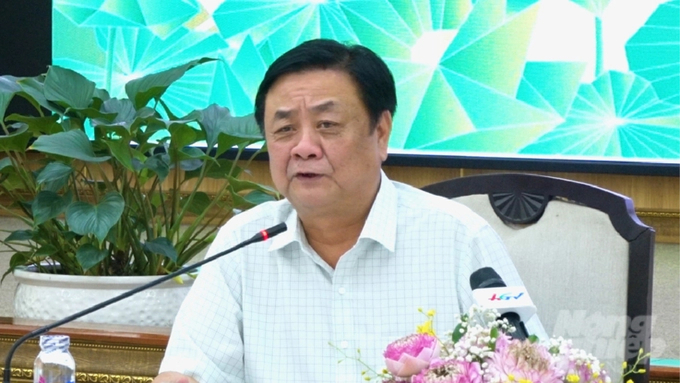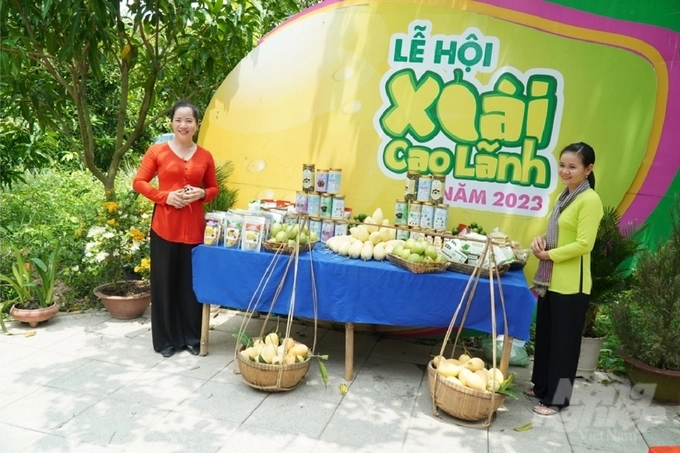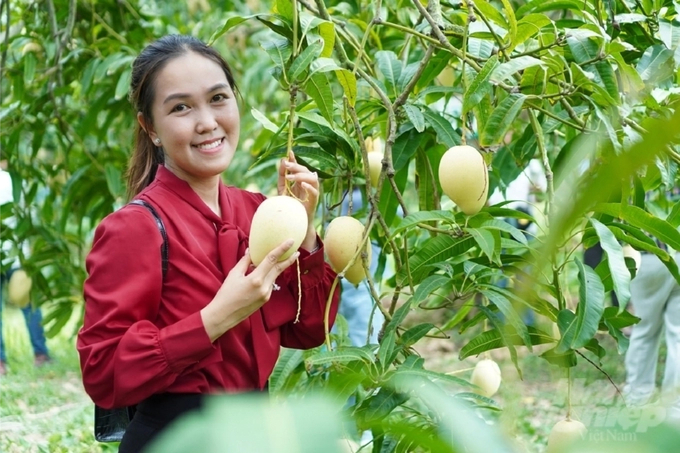November 28, 2025 | 03:46 GMT +7
November 28, 2025 | 03:46 GMT +7
Hotline: 0913.378.918
November 28, 2025 | 03:46 GMT +7
Hotline: 0913.378.918

According to MARD Minister Le Minh Hoan, Vietnam is heading towards responsible, transparent, and sustainable agriculture. Photo: Ho Thao.
Discussing the strategy and navigation for rural agriculture development, MARD Minister Le Minh Hoan shared: Currently, consumers expect food that is not only clean but also nutritious. Moreover, the buyer also wants to know the product’s origin, where the rice grain comes from; if the product’s source can be traced; whether it influences the environment, has negative impacts on biodiversity, or affects public health.
MARD Minister Le Minh Hoan mentioned the EU’s new law, which established strict due diligence on all agricultural products foraged in devastated forests or violated forest laws. To them, the product’s quality or cost does not matter once commodities are linked with deforestation and forest degradation.
The agricultural and rural development strategy must keep building on our success and correcting what went wrong. Vietnam’s agriculture aims to be the foundation for public health – responsible, transparent, and sustainable agriculture.

The unique experiential space at the Dong Thap Mango Festival in 2023. Photo: Ho Thao.
“A clouded agriculture without traceability yet spontaneous – sellers do not know buyers, buyers do not know sellers, and only connect through traders – this interlaced system makes it difficult to move forward. We aim for smart agriculture, multi-value agriculture, and low-cost but high-value agriculture. Our strategy must meet the criteria of building on our achievements. What we approached incorrectly should be addressed and resolved," Minister Le Minh Hoan stated.
According to the Minister, in the development strategy, farmers no longer think about productivity but instead shift focus to the value chain to access the market.
Once farmers’ thinking switches from cultivating innovative products to commercial products, the product enters the market at the most optimal price. Crop yield is not economic thinking but productive thinking, which farmers can devise themselves.
The product maker, indeed, can be proud of what they create. Still, it is risky if the product cannot reach the market or reach the market without sustainability and unity. The lowest level is to sell natural products, the second level is to sell processed products, the third level is to sell commercial goods that have become services, and the last level is to sell experiential economy, which is tourism.
“Consumers can visit to see how the sellers raise fish, grow rice, grow mango; the value of the experiential economy is the last level, and it has no price. Pricing ordinary goods has a referential frame, as do services, but experiences are priceless," the Minister said.

Dong Thap Mango Festival 2023 attracted about 50,000 visitors. Photo: Ho Thao.
The Minister also said that not all farmers could manage tourism immediately, but few people working well can propagate the community. Despite only serving local guests, small business models are crucial to make the countryside more dynamic. Farmers can also be proud when surrounded by well-known peers and no longer have to work alone like before.
Regarding the solution, Minister Le Minh Hoan said that our country’s agriculture and farmers are divided into many tiers, so there is no absolute solution. For example, some people can afford large-scale farms, yet some farmers have only one or two hectares, some have only one or two fields, and some have no land at all. Every solution should be catered to each tier.
“If one has a large-scale farm with peculiar impact, we do not have to include him in a cooperative because he is already capable of self-operating. If one is in the middle or small scale, we should connect them to the cooperative. For households, we find career solutions for them. Local governments must know how to create new industries. For example, one day, when farmers no longer work in the fields, they shall make handicrafts and build upon the advantage of locally available agricultural products,” Minister Le Minh Hoan noted.
Translated by Quynh Chi

(VAN) On November 27, in the meeting with Minister Tran Duc Thang, Mayor Yin Yong shared Beijing’s experience to improve environment and air quality.

(VAN) After 30 years, both sides identified strategic areas of cooperation: sustainable production, increasing coffee value and training for farmers.
/2025/11/27/4910-4-164708_294.jpg)
(VAN) On the afternoon of November 27 in Beijing, Minister of Agriculture and Environment Tran Duc Thang held a working session with several major Chinese enterprises operating in the agriculture and environment sector.

(VAN) The Department of Animal Health issued a provisional guideline requesting local authorities to increase surveillance, collect samples for testing, and conduct epidemiological investigations according to the established procedure.

(VAN) The United Nations recommends that Vietnam utilize data and artificial intelligence to enhance early disaster warnings and reduce GDP losses by 3.2% in the context of climate change.

(VAN) On the morning of November 27 in Beijing, Minister Tran Duc Thang and the Deputy Commissioner General of the General Administration of Customs of China signed a protocol on fresh jackfruit exports.

(VAN) As floodwaters recede, a vast network of irrigation works across eastern Gia Lai is emerging in a state of severe disrepair, with extensive damage demanding urgent restoration ahead of the 2025-2026 winter-spring cropping season.